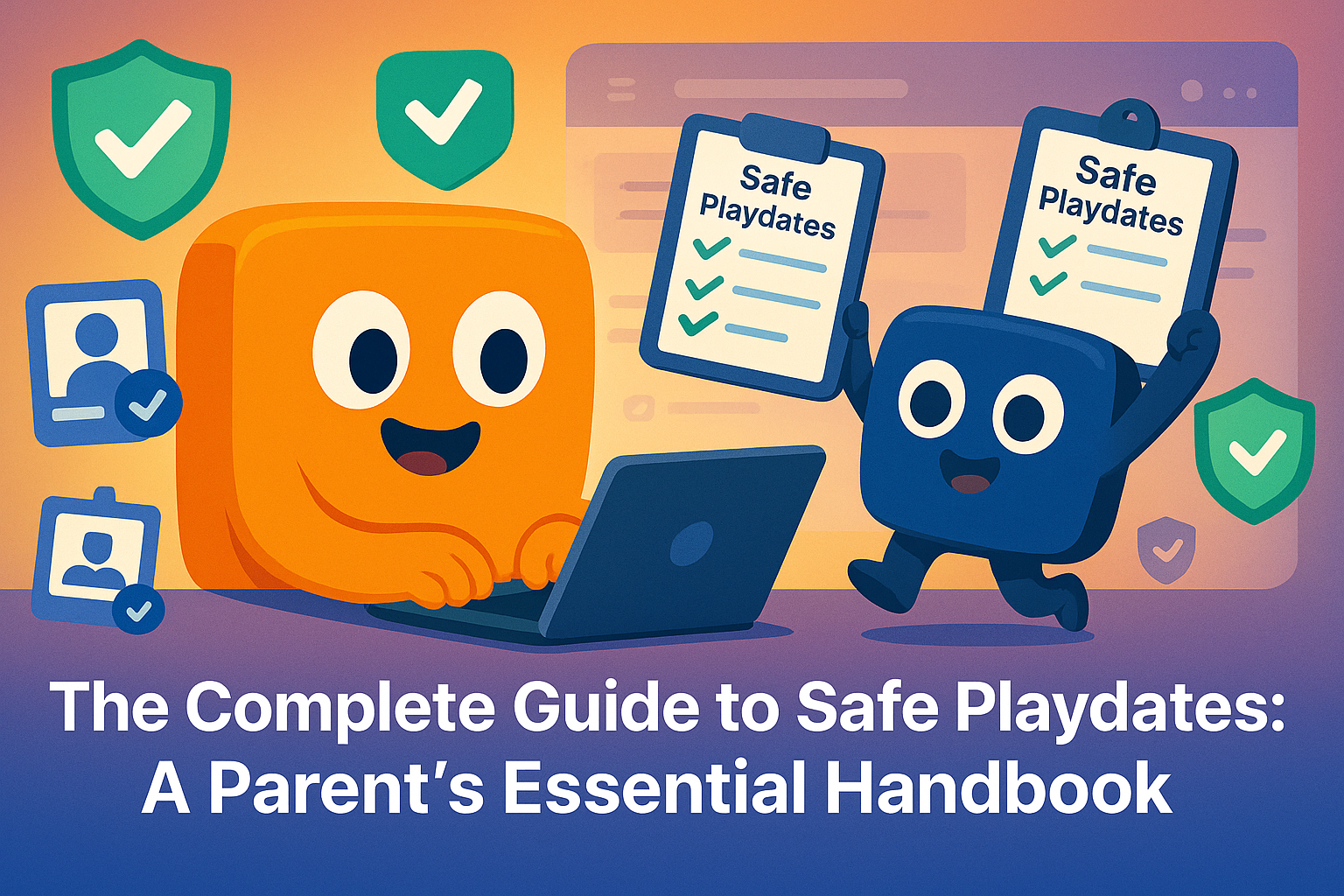Red Flags to Watch For: How to Identify Concerning Behavior in Online Parent Communities
When connecting with other families through online platforms, your parental instincts are your best defense. While most parents are genuine and well-intentioned, it's crucial to recognize warning signs that should make you pause and reconsider a potential connection.
Communication Red Flags
Pressure for Immediate Meetings
Warning Sign: Someone who insists on meeting right away without getting to know you first.
Why It's Concerning: Genuine parents understand the importance of building trust gradually. Pressure tactics often indicate ulterior motives or poor judgment.
What to Do: Insist on taking time to chat online first. A legitimate parent will respect your boundaries.
Avoiding Video Calls
Warning Sign: Reluctance to video chat or always having excuses for why they can't show their face.
Why It's Concerning: Video calls help verify identity and give you a better sense of who you're talking to.
What to Do: Make video chatting a requirement before any in-person meeting.
Inconsistent Information
Warning Sign: Details about their family, location, or circumstances that change or don't add up.
Why It's Concerning: Honest parents don't need to keep track of lies. Inconsistencies often indicate deception.
What to Do: Keep notes of conversations and ask clarifying questions if something doesn't match up.
Oversharing Personal Information
Warning Sign: Sharing intimate details about their life, relationships, or problems very early in the conversation.
Why It's Concerning: This can be a manipulation tactic to create false intimacy and trust.
What to Do: Maintain appropriate boundaries and don't feel obligated to reciprocate with personal information.
Profile and Photo Red Flags
Limited or Professional Photos
Warning Sign: Only one or two photos, or photos that look too professional/stock-photo-like.
Why It's Concerning: Authentic parent profiles typically have multiple casual family photos.
What to Do: Ask for additional photos or suggest a video call to verify identity.
Vague Profile Information
Warning Sign: Profiles with minimal information about their family, interests, or background.
Why It's Concerning: Parents genuinely looking for connections usually provide detailed information to attract compatible families.
What to Do: Ask specific questions about their family and interests before proceeding.
No Mutual Connections
Warning Sign: No shared friends, groups, or connections in your community.
Why It's Concerning: While not always problematic, it's harder to verify someone's legitimacy without mutual connections.
What to Do: Ask about their involvement in local activities, schools, or community groups.
Behavioral Red Flags
Inappropriate Interest in Your Children
Warning Sign: Asking detailed questions about your children's routines, schedules, or personal habits.
Why It's Concerning: While some questions about children are normal, excessive focus on details can indicate inappropriate intentions.
What to Do: Keep conversations about children general and age-appropriate. Trust your instincts if something feels off.
Reluctance to Share Their Own Information
Warning Sign: Deflecting questions about their family while asking many questions about yours.
Why It's Concerning: Healthy relationships involve mutual sharing and openness.
What to Do: Insist on reciprocal information sharing. If they won't open up, consider ending the conversation.
Pushing Boundaries
Warning Sign: Continuing to contact you after you've expressed discomfort or asked for space.
Why It's Concerning: Respecting boundaries is fundamental to any healthy relationship.
What to Do: Be clear about your boundaries and block/report if they continue to push.
Offering Unsolicited Help or Gifts
Warning Sign: Offering to babysit, give gifts, or provide help very early in the relationship.
Why It's Concerning: This can be a grooming tactic to build trust and create obligation.
What to Do: Politely decline and maintain appropriate boundaries for new relationships.
Meeting Arrangement Red Flags
Insisting on Private Locations
Warning Sign: Suggesting meetings at their home, your home, or isolated locations for first meetings.
Why It's Concerning: Safe first meetings should always be in public, well-populated areas.
What to Do: Insist on public meetings and suggest alternatives if they resist.
Bringing Unmentioned Adults
Warning Sign: Showing up with additional adults who weren't mentioned beforehand.
Why It's Concerning: This violates the agreed-upon meeting terms and can be a safety concern.
What to Do: Don't hesitate to leave if the meeting isn't what was agreed upon.
Changing Plans Last Minute
Warning Sign: Frequently changing meeting times, locations, or circumstances.
Why It's Concerning: While occasional changes are normal, frequent changes can indicate disorganization or manipulation.
What to Do: Set clear expectations about planning and follow through.
Technology and Social Media Red Flags
New or Sparse Social Media Presence
Warning Sign: Very new accounts or social media profiles with little history or few connections.
Why It's Concerning: Fake accounts are often newly created with minimal authentic content.
What to Do: Look for established social media presence with authentic interactions and history.
Refusing Platform Verification
Warning Sign: Unwillingness to complete identity verification processes on parenting apps.
Why It's Concerning: Legitimate parents understand the importance of verification for everyone's safety.
What to Do: Only connect with verified users on platforms that offer verification.
Using Only Messaging Apps
Warning Sign: Insisting on moving conversations to encrypted messaging apps immediately.
Why It's Concerning: While privacy is important, this can be a way to avoid platform safety features.
What to Do: Keep initial conversations on the original platform where safety features are available.
Trusting Your Instincts
The Gut Check
Listen to Your Inner Voice: If something feels off, it probably is. Don't ignore your instincts for the sake of being polite.
Common Feelings to Trust:
- Feeling rushed or pressured
- Sensing that someone is "too good to be true"
- Feeling uncomfortable with their questions or comments
- Noticing that conversations feel one-sided or manipulative
When in Doubt, Don't
Better Safe Than Sorry: It's always better to miss out on a potentially good connection than to put your family at risk.
Remember: There are plenty of genuine families looking for connections. Don't settle for situations that make you uncomfortable.
What to Do If You Encounter Red Flags
Document Everything
- Take screenshots of concerning conversations
- Keep records of inappropriate behavior
- Note dates and times of incidents
Report and Block
- Use platform reporting features
- Block the user to prevent further contact
- Share information with platform administrators
Trust Your Network
- Talk to other parents about your concerns
- Share information about problematic users (when appropriate)
- Seek advice from trusted friends or family
Professional Help
- Contact local authorities if you suspect criminal behavior
- Consult with child safety experts if you're unsure
- Seek support if you've been targeted or manipulated
Building Your Safety Skills
Education is Key
- Learn about common online safety threats
- Stay updated on new scams and tactics
- Attend workshops on digital safety for families
Practice Scenarios
- Role-play difficult conversations with your partner
- Discuss safety protocols with your children
- Have a plan for uncomfortable situations
Community Awareness
- Share safety tips with other parents
- Participate in community safety discussions
- Support platforms that prioritize user safety
Conclusion
Recognizing red flags is an essential skill for any parent navigating online communities. While it's important to remain open to new connections, your family's safety must always come first.
Remember that genuine parents will understand and respect your caution. Anyone who pressures you to ignore your instincts or bypass safety measures is not someone you want in your family's life.
Trust yourself, take your time, and don't be afraid to walk away from situations that don't feel right. Your children's safety is worth more than any potential friendship.
Stay safe while building your parent network. My Play Palz is committed to providing the tools and education you need to connect with confidence.



